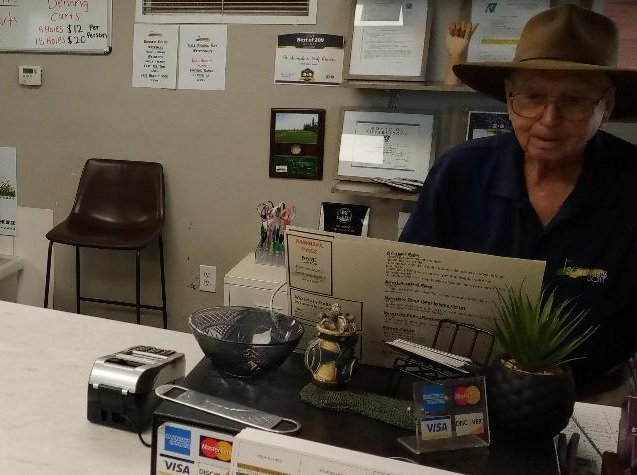An “Arkie’s” Journey to California
Ceres Man Shares His Family’s Trek During the Dust Bowl
Charlie Brown from his post at the pro shop at St. Stanislaus Golf Course. Photo: Steve Newvine
It’s amazing what you can learn about people when you take the time to get to know them.
I met Charlie at the pro shop at a golf course one summer afternoon several years ago. He was on duty that day. In succeeding years, Charlie and I became friends over a cup of coffee midway through my weekly round of golf.
Through the weekly coffee breaks I learned that among other things, Charlie and his family were part of the Dust Bowl influx of people who left the Midwest and southern United States for the promise of a better life in California.
The Dust Bowl refers to a series of severe dust storms that swept across Oklahoma, Arkansas, Kansas and Texas in the 1930s. Photo: State of California Capitol Museum (capitolmuseum.ca.gov)
The Dust Bowl of the 1930s, brought drought and discomfort for many living in Oklahoma, Arkansas, Kansas and Texas. According to the State of California Capitol Museum, where an exhibit was staged in 2014, more than three hundred thousand people packed up their belongings and drove to California during the Dust Bowl years.
According to the Oklahoma Historical Society website, the use of abbreviated terms to indicate state origins is long in practice, and "Okie" is no exception. "Arkie" for Arkansas and "Tex" for Texas are well known and accepted.
Charlie doesn’t remember the trip as he was only six months old when his family made the move from Arkansas.
“My parents, siblings, and even the family German Sheppard made the trip here in 1934,” said Charlie.
“We brought along the family dog with us,” Charlie recalls. “That dog would sit behind the front bumper of the family Model T, right in front of the radiator.”
According to the story Charlie’s parents told him about the trip, the German Sheppard would sit right behind the bumper throughout the journey.
There was enough space between the bumper and the radiator for the dog. There was no room in the car as it was filled with all the family’s possessions.
“When we’d stop for a break, my dad would tell the dog to get up,” he remembers. “The dog would wander around, do his business, and then get back into his spot before we’d all load up in the car.”
Charlie’s work ethic was forged in part by the journey his family made from Arkansas to California in 1934 during the Dust Bowl. Photo: Steve Newvine
Charlie’s family found a new life in the Central Valley. Charlie would work at a number of jobs, primarily in agriculture, throughout his life.
He and his wife owned a fast-food and ice cream franchise for a few years in Ceres, Stanislaus County.
He continues to work, now as a part timer in the golf course pro shop.
Without really putting a finger on the key to his success at work, anyone talking to him can tell you his secret is a strong work ethic.
He’s on the job early, keeps busy when he’s not checking in golfers, and is a reliable team player. “Staying active is my key to a long life,” Charlie says.
It’s been a long journey from Arkansas as a baby, making his way to California during the Dust Bowl, and building a meaningful life in the Central Valley.
He may have started his life as an Arkie, or citizen of Arkansas.
But he’s happy to call California his home and to call himself a Californian.
It’s amazing what you can learn about people when you take the time to get to know them.
Steve Newvine lives in Merced.
In October, he will publish a sequel to his 2016 book California Back Roads.
His California books are available at Lulu.com, or at the Merced County Courthouse Museum Gift Shop.





To explore Steve Newvine's complete collection of books, simply click on the link below.
CLICK HERE
Steve is also open to delivering speeches for service club programs and other public speaking engagements.
Contact him at: SteveNewvine@sbcglobal.net